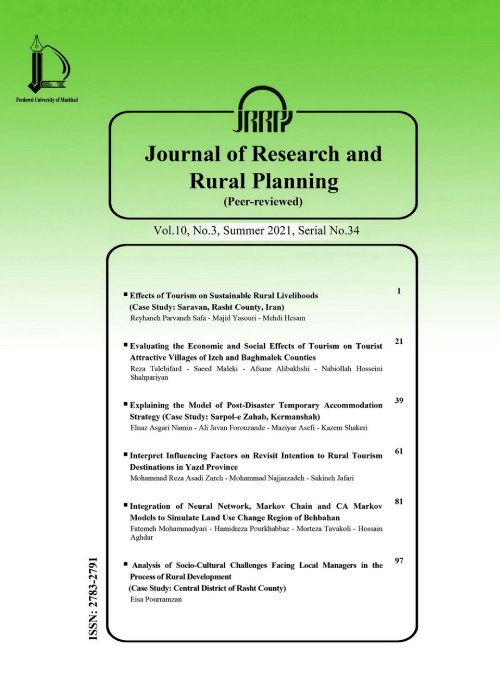Meta-analysis on Rural Tourism Studies in Iran: A Q-Methodology Research
Author(s):
Abstract:
Purpose
This study aims to provide a comprehensive understanding about strategies and guidelines of rural tourism planning and management in Iran, then with the help of experts and their participation identify and classify the different perspectives in Iran rural tourism to finally putting forward a step beyond the current impressions and perceptions. Methodology
In the past few decades, rural tourism has been developed as one of the most prominent industries for diversification and reconstructing rural economy and hence stimulated the attention of scholars and rural development planners. In Iran, from the early years of the twenty-first century rural tourism phenomenon has been entered in scientific/academic literature, especially in Geographical studies. However, until now it has not been considered as a strategy for rural economic development at administrative and executive levels of rural development. This research was conducted on the development of Q-methodology. First, based on the previous research findings on rural tourism in Iran and the analysis of the available discursive atmosphere, it provides a comprehensive understanding about strategies and guidelines of rural tourism planning and management, and then, drawing on the contribution of experts, different perspectives were identified and classified. Finding
Research findings, based on Q factor analysis represent three perspectives in planning and managing of rural tourism development in Iran.The first viewpoint is Institutionalism, holistic, integrated approach, participation-oriented, and community – based, and has a high emphasis on planning of rural tourism development. The second viewpoint is environmentalist-conservationist and integrated-approach, and greater emphasis on the management of various aspects of rural tourism. The third viewpoint is participation-oriented, Supportive- facilitative, conservationist, also places emphasis on the land use planning, and managing rural tourism with respect to rural land conservation against inappropriate changes. Research limitation: Attracting the actual participation of Iranian specialists to participate in Q- methodology is time consuming and difficult. Original/value: After, more than a decade of experience of rural tourism studies in Iranian academic literature, the present research helps to explore thinking patterns in the field of rural tourism planning and management in Iran. Accordingly, we can provide a framework to support an integrated approach of rural tourism development.Keywords:
Rural tourism , meta , analysis , tourism studies , Q , methodology
Language:
Persian
Published:
Journal of Research and Rural Planning, Volume:3 Issue: 3, 2014
Pages:
85 to 99
https://magiran.com/p1368690
دانلود و مطالعه متن این مقاله با یکی از روشهای زیر امکان پذیر است:
اشتراک شخصی
با عضویت و پرداخت آنلاین حق اشتراک یکساله به مبلغ 1,390,000ريال میتوانید 70 عنوان مطلب دانلود کنید!
اشتراک سازمانی
به کتابخانه دانشگاه یا محل کار خود پیشنهاد کنید تا اشتراک سازمانی این پایگاه را برای دسترسی نامحدود همه کاربران به متن مطالب تهیه نمایند!
توجه!
- حق عضویت دریافتی صرف حمایت از نشریات عضو و نگهداری، تکمیل و توسعه مگیران میشود.
- پرداخت حق اشتراک و دانلود مقالات اجازه بازنشر آن در سایر رسانههای چاپی و دیجیتال را به کاربر نمیدهد.
In order to view content subscription is required
Personal subscription
Subscribe magiran.com for 70 € euros via PayPal and download 70 articles during a year.
Organization subscription
Please contact us to subscribe your university or library for unlimited access!



